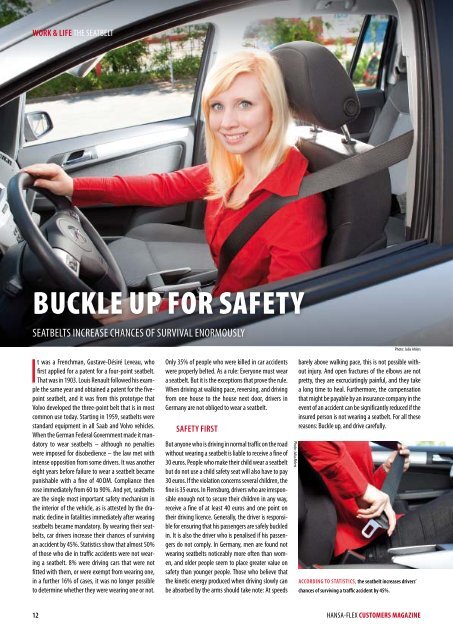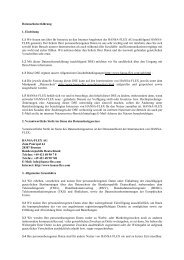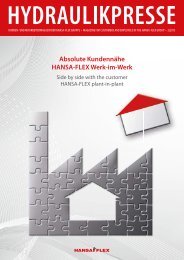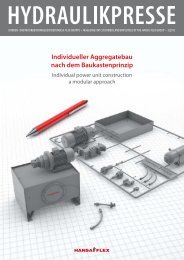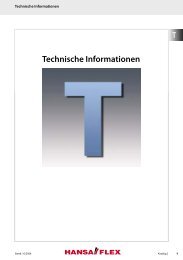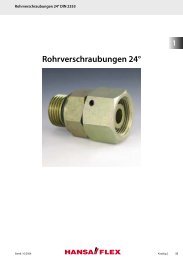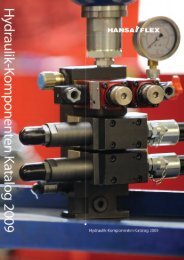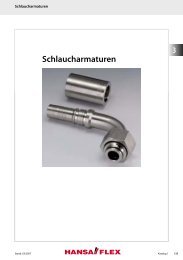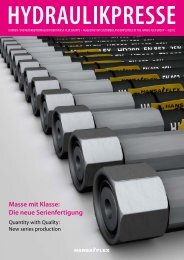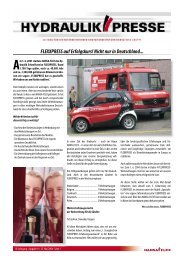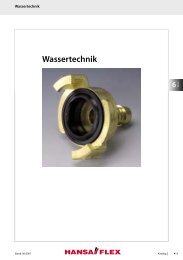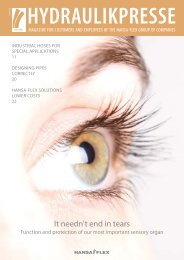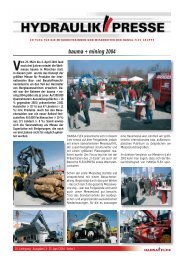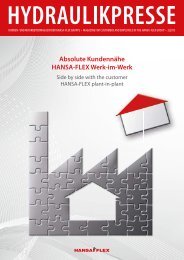HYDRAULIKPRESSE October 2010, english issue - Hansa Flex
HYDRAULIKPRESSE October 2010, english issue - Hansa Flex
HYDRAULIKPRESSE October 2010, english issue - Hansa Flex
Create successful ePaper yourself
Turn your PDF publications into a flip-book with our unique Google optimized e-Paper software.
Work & liFe the seatBelt<br />
BUcKLe UP For saFetY<br />
seatBelts increase chances of survival enorMously<br />
it was a frenchman, gustave-désiré leveau, who<br />
first applied for a patent for a four-point seatbelt.<br />
that was in 1903. louis renault followed his example<br />
the same year and obtained a patent for the fivepoint<br />
seatbelt, and it was from this prototype that<br />
volvo developed the three-point belt that is in most<br />
common use today. starting in 1959, seatbelts were<br />
standard equipment in all saab and volvo vehicles.<br />
When the german federal government made it mandatory<br />
to wear seatbelts – although no penalties<br />
were imposed for disobedience – the law met with<br />
intense opposition from some drivers. it was another<br />
eight years before failure to wear a seatbelt became<br />
punishable with a fine of 40 dM. compliance then<br />
rose immediately from 60 to 90%. and yet, seatbelts<br />
are the single most important safety mechanism in<br />
the interior of the vehicle, as is attested by the dramatic<br />
decline in fatalities immediately after wearing<br />
seatbelts became mandatory. By wearing their seatbelts,<br />
car drivers increase their chances of surviving<br />
an accident by 45%. statistics show that almost 50%<br />
of those who die in traffic accidents were not wearing<br />
a seatbelt. 8% were driving cars that were not<br />
fitted with them, or were exempt from wearing one,<br />
in a further 16% of cases, it was no longer possible<br />
to determine whether they were wearing one or not.<br />
only 35% of people who were killed in car accidents<br />
were properly belted. as a rule: everyone must wear<br />
a seatbelt. But it is the exceptions that prove the rule.<br />
When driving at walking pace, reversing, and driving<br />
from one house to the house next door, drivers in<br />
germany are not obliged to wear a seatbelt.<br />
saFety First<br />
But anyone who is driving in normal traffic on the road<br />
without wearing a seatbelt is liable to receive a fine of<br />
30 euros. people who make their child wear a seatbelt<br />
but do not use a child safety seat will also have to pay<br />
30 euros. if the violation concerns several children, the<br />
fine is 35 euros. in flensburg, drivers who are irresponsible<br />
enough not to secure their children in any way,<br />
receive a fine of at least 40 euros and one point on<br />
their driving licence. generally, the driver is responsible<br />
for ensuring that his passengers are safely buckled<br />
in. it is also the driver who is penalised if his passengers<br />
do not comply. in germany, men are found not<br />
wearing seatbelts noticeably more often than women,<br />
and older people seem to place greater value on<br />
safety than younger people. those who believe that<br />
the kinetic energy produced when driving slowly can<br />
be absorbed by the arms should take note: at speeds<br />
photo: Julia ahlers<br />
photo: Julia ahlers<br />
barely above walking pace, this is not possible without<br />
injury. and open fractures of the elbows are not<br />
pretty, they are excruciatingly painful, and they take<br />
a long time to heal. furthermore, the compensation<br />
that might be payable by an insurance company in the<br />
event of an accident can be significantly reduced if the<br />
insured person is not wearing a seatbelt. for all these<br />
reasons: Buckle up, and drive carefully.<br />
aCCordiNG to statistiCs, the seatbelt increases drivers’<br />
chances of surviving a traffic accident by 45%.<br />
12 hansa-fleX Customers magazine


